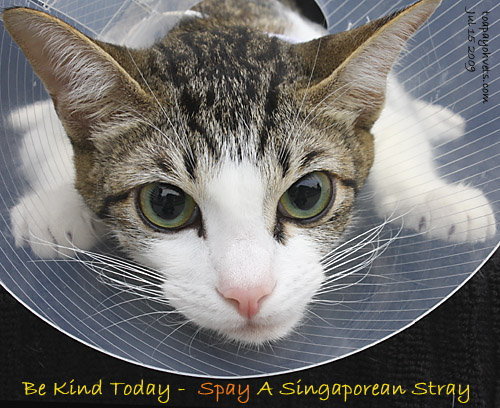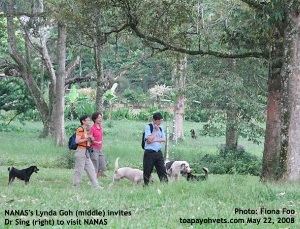PASSIONATE ANIMAL ACTIVISM
ANTAGONISING SERVICE PROVIDERS AND VOLUNTEERS
Dr Sing Kong Yuen, BVMS
(Glasgow), MRCVS
First written: Saturday 24 May 2008 6.05 am
Updated:
05 August, 2009
SIX
years had passed so quickly when I review one of my
first attempts in producing the "Be Kind Today - Adopt a
Singaporean stray" digital image to encourage
Singaporeans to adopt the homeless street cat instead of
buying one.
This picture haunts me with the mist of sadness every
time I see the eyes of this tom-cat who had his left ear
clipped after neutering and was recovering from the
anaesthesia.
It recalls the efforts of animal activism of a stick-thin,
pale-looking bespectacled Toa Payoh girl of around 30
years old as the street
cat in the picture was one she picked up from the hawker
centres of Toa Payoh and I had neutered it for her.
She would care for any sick stray cat and kitten in
Singapore and probably starve herself. Her husband would
support her in her animal activism. Both of them spent
their own money and lots of time to save the sick homeless cats.
 |
|
Dr Sing's
"Adopt A Singaporean Stray" picture in 2003 |
I did my best but my best was not good enough for her.
Soon, she demanded priority for her sick street cats,
free services and numerous telephone advices. Cutting
queues and getting very angry when she could not get
priority. She wanted me to charge the lowest price as she got more
homeless cats to be treated. I knew she had no money but
neither did I. I had a practice to build up.
 |
|
Dr Sing's
"Spay A Singaporean Stray" picture in 2009
|
Some of the stray could not be
cured because there was no follow-up and more laboratory
tests to be performed but there was just no money to do
them. She
would get depressed and angry. I had to decline
helping her as there was no light at the end of the
tunnel. In retrospect and with the last 6 years of hard
experiences, I should have had helped her raise funds
for her admirable work. But at that time, I was barely
surviving in my practice and had another job to do to
survive.
It is hard for animal activists trying to get homeless
animals treated free of charge all the time. Vets do need to sustain their business growth and
need to provide competitive good services to pet owners.
They
are not going to get more pet owners by being more
charitable because they can't provide the high level of
service expected from a paying customer if they spend
much of their time on treating the animal welfare cases
going out of the surgery. Thus they do not have much time to devote to the paying clients.
The latter
just go to the competition who provides excellent
customer care service.
If vets are not able to make sufficient money to pay their staff,
increasing overheads due to new government regulations and
investments in equipment to upgrade their practice, they
become bankrupted sooner or later. Competitors attract
their experienced staff with offers of higher salaries
and that is the best way in killing off the competition
as these staff usually have no integrity about
contacting clientele of the previous employer to the new
veterinary practice.
Why train a newbie when you can employ competitors'
experienced staff? In fact, many veterinary
organisations from the
public and private sectors in Singapore have had no qualms about
recruiting experienced staff from their competitors or
ex-employer to kick-start their new practice.
Why suffer the hassles of training the green horns in
the veterinary animal management when you can get
experienced veterinary technicians and nurses from
competitors who knows what to do on day 1 of employment
and gain a competitive advantage?
Animal activists need to understand the practical
challenges and economics of sustaining the growth of
private veterinary practices - there
is a limit to what free services a veterinarian can
offer in the face of the storms of regulatory changes
sucking up more capital,
under-pricing and challenges from new
competition and para-veterinary professionals, amongst
other things. "Vets are supposed to love animals and
care for the sick ones - so they should provide free
services", the animal activist thinks. Yes, to a
practical extent, vets do provide free services for some
animals and owners in need, but there must be a balance
as private veterinary practices in Singapore are not
charitable establishments nor do they get public
funding should they fail to sustain their business.
There's so much passion and emotion involved in making
the world a better place for animals. Animal activists
want to promote the welfare of creatures who can't speak out or defend
themselves. But strong emotions can't help the poor
homeless animals at all if the animal activists cause conflicts
to the
service providers by being demanding and aggressive.
Who cares for the vets when they can't sustain the
growth of their private practice or become homeless due
to bankruptcy? The public perceives all veterinarians
as being successful and make a lot of money.
Therefore, some expect vets to give back to the
society by providing free spays and treatment to all
sick and homeless animals.
Animal activists want
things done for the homeless and sick animals, but they are perpetually short of funds to
pay for the care of the
increasing number of animals needing help. Many don't
know how to be proactive to raise funds. They try not
to use their personal savings as after all, the
animals are "strays".
It will be in the interest of the homeless animals that
passionate animal activists can find a way to communicate, to work closely with
the service providers of different personalities as
patiently as possible.
In being able to work with service providers and
volunteers in an amicable manner, the animal activist
or "animal welfare volunteer" execute their ideals and make a
difference.
In addition to humility and patience, passionate animal activism requires
perseverance and a deeper understanding of the points of
views of the other parties that may undermine with their
idealism. In this way, they may successfully achieve
what they set out to do - give a voice to and help the
animals in need of help.
There will be stresses in animal welfare work. I have
no doubt about it. Stresses cause the greying of hairs
and loss of personal savings and health as more
animals are abandoned to the animal activists by
members of the public. Yet donations and volunteers
are in short supply.
Do
what you can if you can't be proactive to mobilise
volunteers via the internet or networking. Save a
stray cat one at a time if that is what you can
afford to do so.
You don't have to bear the globe of animal cruelty on
your shoulders if you don't have the personality,
health and finances to do it. If you can
only afford to save one stray cat, then do save that
one. It is just not possible to do more.
 |
|
Dr Sing gets to
know more about the work of NANAS (Noah's Ark And
Natural Animal Sanctuary) in Johor through the
high energy animal welfare volunteer, Ms
Lynda Goh |
BE ORGANISED.
If you want to save more animals, organise yourself to
do the job without expecting handouts from the service
providers. Create a
"business plan", do research as there may be
"animal protection grants". Network to raise
funds. At all times, communicate gently and regularly with the service
providers, including vets. Motivate them. Give
them praises but be sincere. Just don't pester for free
services, priority services and handouts from every
veterinarian in Singapore.
 VOLUNTEERS
AT SALES KIOSK. VOLUNTEERS
AT SALES KIOSK.
Reply to their e-mails or phone calls when
volunteers "drop" out of volunteering at sales
kiosks after some months or years of volunteerism.
These are your foot soldiers. Do not just ignore these volunteers who "drop"
out after some months with you at sales kiosks,
especially when they take the trouble to let you know.
Since you are the one who has got the volunteer's
services, be gracious enough to make a phone call and
thank them. Send them a card of thanks.
Sometimes, they
drop out due to personal reasons and your phone call or
card of appreciation for
their services will endear you to them and at another
time, they may come forth to volunteer again when you
ask them. Unfortunately, you may be so busy and hectic
in your animal activism work and you think you will have
other volunteers. It is much easier to retain an
experienced foot soldier who may need to stop for a while
than to get a new one.
INTERNET.
Many charitable organisations have successfully
raised funds and created awareness of their causes using
the internet's free blogs and networking sites. Your
website needs to be updated frequently. It will be daily
hard work to update an audience and a group of
supporters who are interested in your cause. There is no
other less expensive way to update and raise funds for
the cause you fervently believe in.
CONCLUSION.
Belief, Passion,
Drive & Perseverance are what makes you successful in
your animal activism cause. If you have only passion, it
will be difficult to succeed. Change the world, but do
it one case or one day at a time if you don't have
sufficient
drive or the perseverance to do it.
|
 TOA
PAYOH VETS
TOA
PAYOH VETS TOA
PAYOH VETS
TOA
PAYOH VETS